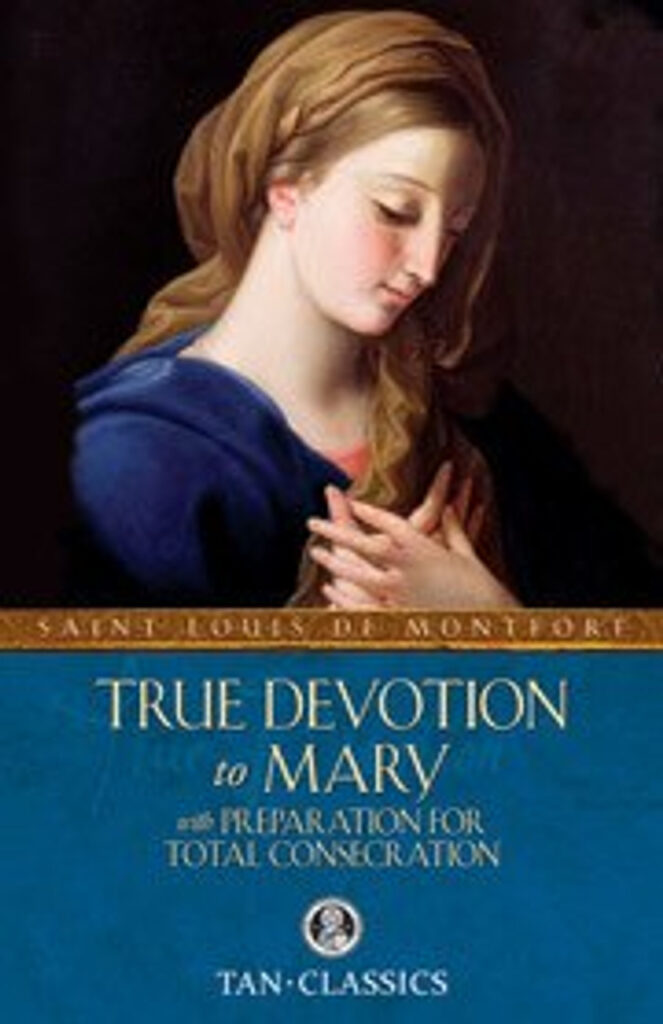If we wish to be perfect, we ought to strive to imitate Our Lord. Yet, despite our greatest efforts, we often fall short. The secret toward unity with Christ lines in the consecrate of our souls to Mary. Here, Saint Louis de Montfort discusses perfection consecration to Jesus Christ and the necessity of consecration to Our Lady.
All our perfection consists in being conformed, united and consecrated to Jesus Christ; and therefore the most perfect of all devotions is, without any doubt, that which the most perfectly conforms, unites and consecrates us to Jesus Christ. Now, Mary being the most conformed of all creatures to Jesus Christ, it follows that, of all devotions, that which most consecrates and conforms the soul to Our Lord is devotion to His holy Mother, and that the more a soul is consecrated to Mary, the more it is consecrated to Jesus.
Hence it comes to pass that the most perfect consecration to Jesus Christ is nothing else but a perfect and entire consecration of ourselves to the Blessed Virgin, and this is the devotion which I teach; or, in other words, a perfect renewal of the vows and promises of holy Baptism.
—Article One—
A Perfect and Entire Consecration of Oneself to the Blessed Virgin
This devotion consists, then, in giving ourselves entirely to Our Lady, in order to belong entirely to Jesus through her.1 We must give her (1) our body, with all its senses and its members; (2) our soul, with all its powers; (3) our exterior goods of fortune, whether present or to come; (4) our interior and spiritual goods, which are our merits and our virtues, and our good works, past, present and future. In a word, we must give her all we have in the order of nature and in the order of grace, and all that may become ours in the future, in the orders of nature, grace and glory; and this we must do without the reserve of so much as one farthing, one hair, or one least good action; and we must do it also for all eternity; and we must do it, further, without pretending to, or hoping for, any other recompense for our offering and service except the honor of belonging to Jesus Christ through Mary and in Mary—as though that sweet Mistress were not (as she always is) the most generous and the most grateful of creatures.
Here we must note that there are two things in the good works we perform, namely, satisfaction and merit; in other words, their satisfactory or impetratory value, and their meritorious value. The satisfactory or impetratory value of a good action is that action inasmuch as it satisfies for the pain due to sin, or obtains some new grace; the meritorious value, or the merit, is the good action inasmuch as it merits grace now and eternal glory hereafter. Now, in this consecration of ourselves to Our Lady, we give her all the satisfactory, impetratory and meritorious value of our actions; in other words, the satisfactions and the merits of all our good works. We give her all our merits, graces and virtues—not to communicate them to others, for our merits, graces and virtues are, properly speaking, incommunicable, and it is only Jesus Christ who, in making Himself our surety with His Father, is able to communicate His merits—but we give her them to keep them, augment them and embellish them for us, as we shall explain by and by. Our satisfactions, however, we give her to communicate to whom she likes, and for the greatest glory of God.
It follows from this that:
1. By this devotion we give to Jesus Christ in the most perfect manner, inasmuch as it is by Mary’s hands, all we can give Him, and far more than by any other devotions in which we give Him either a part of our time, or a part of our good works, or a part of our satisfactions and mortifications; because here everything is given and consecrated to Him, even the right of disposing of our interior goods and of the satisfactions which we gain by our good works day after day. This is more than we do even in a religious order. In religious orders we give God the goods of fortune by the vow of poverty, the goods of the body by the vow of chastity, our own will by the vow of obedience, and sometimes the liberty of the body by the vow of cloister. But we do not by these vows give Him the liberty or the right to dispose of the value of our good works; and we do not strip ourselves, as far as a Christian man can do so, of that which is dearest and most precious, namely, our merits and our satisfactions.
2. A person who is thus voluntarily consecrated and sacrificed to Jesus Christ through Mary can no longer dispose of the value of any of his good actions. All he suffers, all he thinks, all the good he says or does, belongs to Mary, in order that she may dispose of it according to the will of her Son and His greatest glory—without, however, that dependence interfering in any way with the obligations of the state we may be in at present or may be placed in for the future; for example, the satisfactory and impetratory value of the Holy Mass to some private person. For we make the offering of this devotion only according to the order of God and the duties of our state.
3. We consecrate ourselves at one and the same time to the most holy Virgin and to Jesus Christ; to the most holy Virgin as to the perfect means which Jesus Christ has chosen whereby to unite Himself to us, and us to Him; and to Our Lord as to our Last End, to whom, as our Redeemer and our God, we owe all we are.
ooo
This article is taken from a chapter in True Devotion to Mary with Preparation for Consecration by St. Louis de Montfort which is available from TAN Books.






